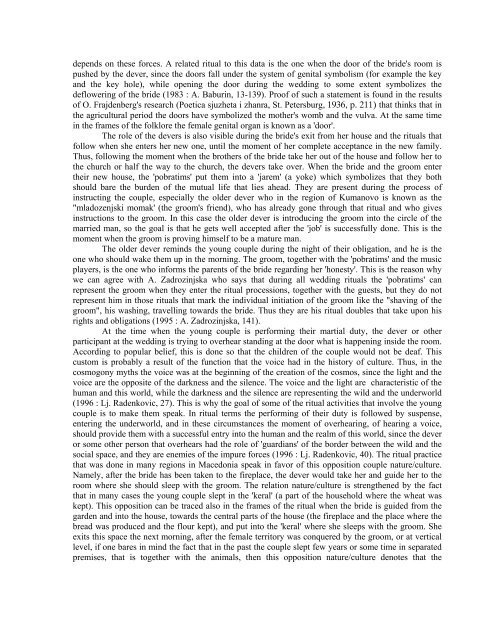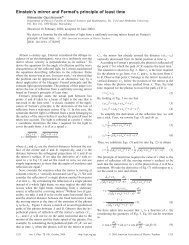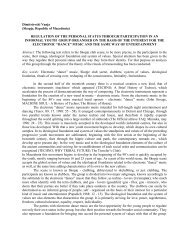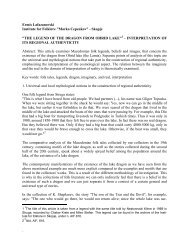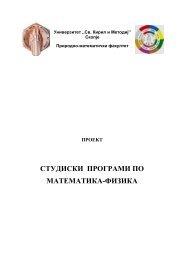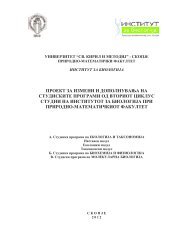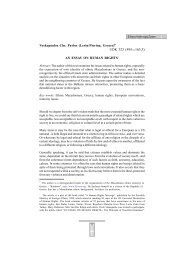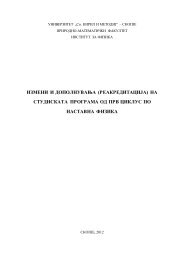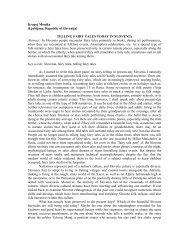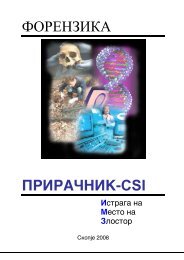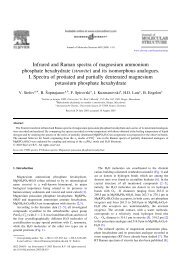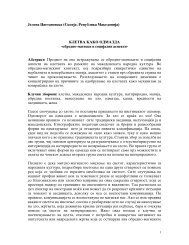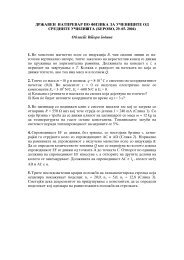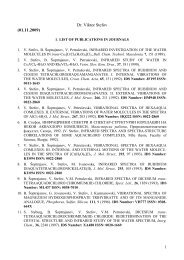Petreska Vesna (Skopje, Republic of Macedonia) THE 'DEVER ...
Petreska Vesna (Skopje, Republic of Macedonia) THE 'DEVER ...
Petreska Vesna (Skopje, Republic of Macedonia) THE 'DEVER ...
You also want an ePaper? Increase the reach of your titles
YUMPU automatically turns print PDFs into web optimized ePapers that Google loves.
depends on these forces. А related ritual to this data is the one when the door <strong>of</strong> the bride's room ispushed by the dever, since the doors fall under the system <strong>of</strong> genital symbolism (for example the keyand the key hole), while opening the door during the wedding to some extent symbolizes thedeflowering <strong>of</strong> the bride (1983 : A. Baburin, 13-139). Pro<strong>of</strong> <strong>of</strong> such a statement is found in the results<strong>of</strong> O. Frajdenberg's research (Poetica sjuzheta i zhanra, St. Petersburg, 1936, r. 211) that thinks that inthe agricultural period the doors have symbolized the mother's womb and the vulva. At the same timein the frames <strong>of</strong> the folklore the female genital organ is known as a 'door'.The role <strong>of</strong> the devers is also visible during the bride's exit from her house and the rituals thatfollow when she enters her new one, until the moment <strong>of</strong> her complete acceptance in the new family.Thus, following the moment when the brothers <strong>of</strong> the bride take her out <strong>of</strong> the house and follow her tothe church or half the way to the church, the devers take over. When the bride and the groom entertheir new house, the 'pobratims' put them into a 'jarem' (a yoke) which symbolizes that they bothshould bare the burden <strong>of</strong> the mutual life that lies ahead. They are present during the process <strong>of</strong>instructing the couple, especially the older dever who in the region <strong>of</strong> Kumanovo is known as the"mladozenjski momak' (the groom's friend), who has already gone through that ritual and who givesinstructions to the groom. In this case the older dever is introducing the groom into the circle <strong>of</strong> themarried man, so the goal is that he gets well accepted after the 'job' is successfully done. This is themoment when the groom is proving himself to be a mature man.The older dever reminds the young couple during the night <strong>of</strong> their obligation, and he is theone who should wake them up in the morning. The groom, together with the 'pobratims' and the musicplayers, is the one who informs the parents <strong>of</strong> the bride regarding her 'honesty'. This is the reason whywe can agree with A. Zadrozinjska who says that during all wedding rituals the 'pobratims' canrepresent the groom when they enter the ritual processions, together with the guests, but they do notrepresent him in those rituals that mark the individual initiation <strong>of</strong> the groom like the "shaving <strong>of</strong> thegroom", his washing, travelling towards the bride. Thus they are his ritual doubles that take upon hisrights and obligations (1995 : A. Zadrozinjska, 141).At the time when the young couple is performing their martial duty, the dever or otherparticipant at the wedding is trying to overhear standing at the door what is happening inside the room.According to popular belief, this is done so that the children <strong>of</strong> the couple would not be deaf. Thiscustom is probably a result <strong>of</strong> the function that the voice had in the history <strong>of</strong> culture. Thus, in thecosmogony myths the voice was at the beginning <strong>of</strong> the creation <strong>of</strong> the cosmos, since the light and thevoice are the opposite <strong>of</strong> the darkness and the silence. The voice and the light are characteristic <strong>of</strong> thehuman and this world, while the darkness and the silence are representing the wild and the underworld(1996 : Lj. Radenkovic, 27). This is why the goal <strong>of</strong> some <strong>of</strong> the ritual activities that involve the youngcouple is to make them speak. In ritual terms the performing <strong>of</strong> their duty is followed by suspense,entering the underworld, and in these circumstances the moment <strong>of</strong> overhearing, <strong>of</strong> hearing a voice,should provide them with a successful entry into the human and the realm <strong>of</strong> this world, since the deveror some other person that overhears had the role <strong>of</strong> 'guardians' <strong>of</strong> the border between the wild and thesocial space, and they are enemies <strong>of</strong> the impure forces (1996 : Lj. Radenkovic, 40). The ritual practicethat was done in many regions in <strong>Macedonia</strong> speak in favor <strong>of</strong> this opposition couple nature/culture.Namely, after the bride has been taken to the fireplace, the dever would take her and guide her to theroom where she should sleep with the groom. The relation nature/culture is strengthened by the factthat in many cases the young couple slept in the 'keral' (a part <strong>of</strong> the household where the wheat waskept). This opposition can be traced also in the frames <strong>of</strong> the ritual when the bride is guided from thegarden and into the house, towards the central parts <strong>of</strong> the house (the fireplace and the place where thebread was produced and the flour kept), and put into the 'keral' where she sleeps with the groom. Sheexits this space the next morning, after the female territory was conquered by the groom, or at verticallevel, if one bares in mind the fact that in the past the couple slept few years or some time in separatedpremises, that is together with the animals, then this opposition nature/culture denotes that the


